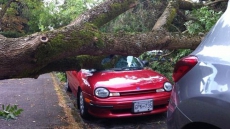British Columbia government’s legislation introduced on November 5, made it clear that land in the Agricultural Land Reserve (ALR) is for farming and ranching in BC, not for dumping construction waste or building mega-mansions.
Last year, British Columbia government’s legislation introduced on November 5, made it clear that land in the Agricultural Land Reserve (ALR) is for farming and ranching in BC, not for dumping construction waste or building mega-mansions. On November 27, Bill 52, the Agricultural Land Commission Amendment Act became law which will come into force by regulation this year.
The legislation makes three key changes: restoring the integrity of the Agricultural Land Reserve (ALR) by reinstating one zone for all ALR land in BC, making it clear that all land in the ALR benefits from the same strong protections; addressing mega-mansions and speculation in the ALR by limiting new house sizes to less than 500 square metres [about 5,400 square feet], except through application to the Agricultural Land Commission (ALC) in cases where it would support farming; and requiring an ALC approval of any additional residences in the ALR to curb non-farm development; and cracking down on the dumping of construction debris, toxic waste and other fill in the ALR that can irreparably damage arable soil on valuable farmland, through increased penalties. The government believes that building of mansions and lifestyle estates on ALR land in urban areas has steadily increased in recent years, inflating farmland prices and preventing new, often younger farmers from growing food.

The announcement of this Bill led to a lot of chaos and opposition especially from local farmers who did not agree to the new changes; the BC Liberal Caucus voted against it as well. Two key points were brought fought by unsatisfied farmers – one that farmer’s opinion was not taken into consideration before proposing the Bill; two, the house size restrictions is unjustified. “This legislation is about three things – ensuring fairness across the ALR by moving to a one zone system, preserving quality agricultural soil, and preventing farmland from being priced out of the reach of farmers,” says BC’s Agriculture Minister Lana Popham, who points out that the Minister of Agriculture’s Advisory Committee held stakeholder consultation meetings in nine communities across BC. They met with local governments, farming and ranching associations, and other agricultural organizations, including the BC Agriculture Council, which represents nearly 30 farm associations that generate 96 per cent of provincial farm gate sales.

“I am not in support of Bill 52 as it has been brought in hastily without proper consultation with the farming community,” declares Gurdial Badh who has been in the farming business for over 25 years in Delta and Richmond, and is the founder of Richmond Farmland Owners Association and Chair of BC Farmland Owners Association (BCFOA). “At the time of the consultation period, the farmers are busy with planting and getting ready for the upcoming season so they really did not have the opportunity to participate as they were not aware,” comments Badh. The BCFOA was formed on November 15, 2018, in response to the tabling of Bill 52. In a very short amount of time, the BCFOA signed up close to 400 farming families (2,700 people) from across BC that collectively farm over 17,000 acres of farmland.

Gunraj Gill, whose firm Aurora Advisory Group Ltd. has been retained by the BCFOA in a strategic advisory role, reveals that the Committee conducted a public engagement campaign from February through April of 2018. “During this period, the committee only heard from 2271 people on house sizes. Out of which only 392 responses stated that large homes should not be permitted on ALR land (7% of 61 written responses and 29% of 1340 online responses). Out of over 2200 responses, only 12% respondents believed that the Provincial Government should regulate house sizes. Out of over 2200 responses, only 10% respondents believed that Local Governments should regulate house sizes.” He further adds that by engaging in a defensive approach to law making which is not based on evidence, the Government’s actions are directly affecting farmers by creating economic uncertainty within the farming community and putting its long-term sustainability at risk.
Surrey-Cloverdale’s MLA, Marvin Hunt, strongly disapproves the bill for multiple reasons; one of them being the size restrictions. “This bill limits the square footage of the house rather than the foot print of the house. If the intent of the bill is to save agricultural land, the foot print of the house should be the issue, not how high the building is. What difference does it make to the agricultural use of the land if the house is one, two or three stories high?” He also remarks out that the bill will not help curb speculation – rather it will hurt farmers by increasing their paperwork and costs.

The legislation ensures that all farming families who need the extra space to farm and to support their farming operations have a path forward at the ALC for them to build a house larger than 5,400 square feet. Also, the Bill will not damage those people who have existing permits and authorizations in place. “They will have until November 5, 2019 — a full year from the date that this bill was introduced — to begin the construction work. They will no longer be required to have a substantially started construction of the foundation,” says Minister Popam. Gill here however notes that this might not apply to members that had their pre-load permit issued but are waiting to apply for a building permit. “Sometimes the pre-load process can take anywhere from 1-3 years with significant financial costs before somebody can even apply for a building permit.”
MLA Hunt believes that the government has not been clear about how their new rules around farmland use will be enforced, and this bill will have a number of negative impacts on BC’s hardworking farmers. Badh agrees, “The Bill 52 will have a negative impact on agriculture property values and will make it difficult for them to live together and farm. If these families can not build homes according to their needs than they will not buy farmland and we will lose these farming families. Badh believes that farmers should be able to decide on the size of home that is needed, provided they are actively farming the lands. “Farming is not a one person operation and needs help from other family members to help out. We have joint families who have purchased these properties in hopes of working together and to keep their children busy working on the farms.”


